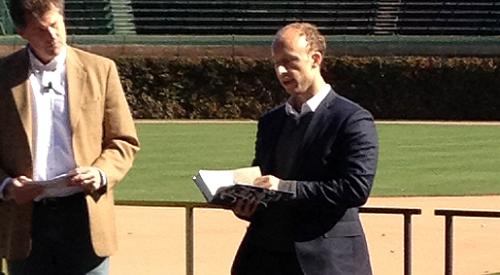
The Art of Fielding (2011)
Rating: 9/10
Ever notice how the best sports novels aren’t really about sports at all?
Chad Harbach’s “The Art of Fielding” arrived last fall with more hype around it than anything I can remember for a first-time novelist. He’s a founding editor at N+1, a magazine notorious for its book criticism (motto: not always very nice), and a bidding war over the manuscript. But forget the hype and whatever you’ve heard. This is a very good novel featuring a lot of baseball action, but its focus stretches far beyond sports.
It’s a story all too familiar to baseball fans: the talented player makes one mistake. Not always a big one, but a glaring one. A pitch sails way outside, a throw to first into the crowd. It’s what happened to Rick Ankiel, to Steve Blass, to Chuck Knoblauch. Maybe they’re haunted about messing up again and will start thinking about everything. Obsessing over details, exhausting themselves to correct the mistake, but one leads to another and another.
That’s what happens to Henry Skrimshander. He’s the star shortstop for the Westish Harpooners. He bats above .500 and is about to tie an NCAA record for errorless games in a row. Then a routine throw to first veers into the dugout, sending teammate Owen Dunne to the hospital and Skrimshander falls into Steve Blass syndrome. As he struggles, Harpooner captain Mike Schwartz realizes all the time he’s spent working with Skrimshander came at the cost of his future. Elsewhere at Westish, school president Guert Affenlight falls for a student – the same one hit by Skrimshander’s toss – and as his daughter Pella arrives at his doorstep, fleeing a dead marriage in search of a new start.
[php snippet=1]
“The Art of Fielding” follows these five people through a baseball season. They each have their own problems –self-doubt, lust, frustration and ennui – which intersect as the season drags on. But the beauty of the book is in the details; in how he makes fictional Westish College come alive. Each character acts like a real person, giving the story a sense of authenticity.
But the writing is also great. “The Art of Fielding” runs the gamut of emotions: it’s equally funny and tragic, sometimes within moments of each other. As a writer, Harbach has a knack for playing with the reader, toying with a feeling before pulling back for a punch line. He’s also good at giving each character a different voice: Skrimshander is from a small town, Pella is overeducated and Mike is an interesting mix of classical scholar and Crash Davis. Here he is explaining baseball:
But baseball was different. Schwartz thought of it as Homeric – not a scrum but a series of isolated contests. Batter versus pitcher, fielder versus ball. You couldn’t storm around, snorting and slapping people, the way Schwartz did in football. You stood and waited and tried to still your mind. When your moment came, you had to be ready, because if you fucked up, everyone would know whose fault it was. What other sport not only kept a stat as cruel as the error but posted it on the scoreboard for everyone to see? (pg 259)
Baseball is at the forefront of this novel, but it’s not just about the sport. It’s about the challenges these people face, which come out and blindside them and how getting past their problems will define them. Indeed, Pella is one of the more interesting characters in the book: she’s bright and radiates intelligence, but never completed post-secondary, running off to the West Coast to get married.
This isn’t a flawless book. At over 500 pages, it’s a little long (although the ending is worth the wait) and occasionally opaque (with many references to Herman Melville that may leave some readers in the dark) but it’s remarkably strong as a whole. Harbach’s plot is complex; often overlapping between different voices, but it’s fully formed and executed, with every detail adding up to a payoff. It’s often funny, occasionally sad and sometimes both at the same time.
I enjoyed reading this novel more than anything I’ve read in a while. Forget sports novels, this is a great novel. It blows its competition – Frank Deford’s “Everybody’s All American,” Philip Roth’s “The Great American Novel,” Bernard Malmud’s “The Natural” – out of the water with the way it captures the emotions and play of those playing and watching the game.
Is it about baseball? It is and it isn’t and in a way, I haven’t enjoyed a sports novel this much since “Infinite Jest.” This one comes highly recommended and will be available in paperback in May.
[php snippet=1]

